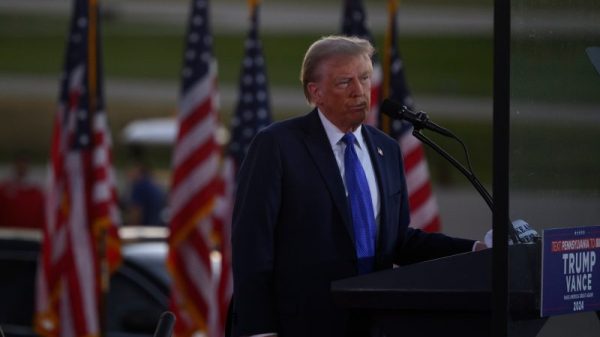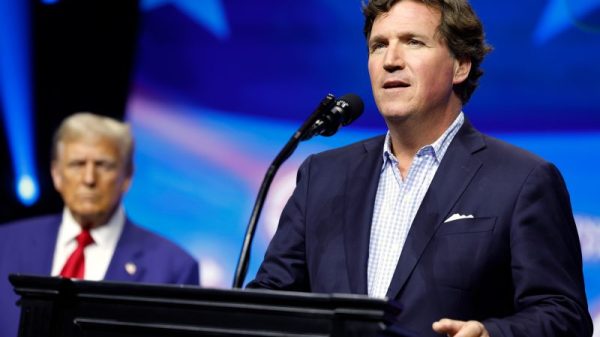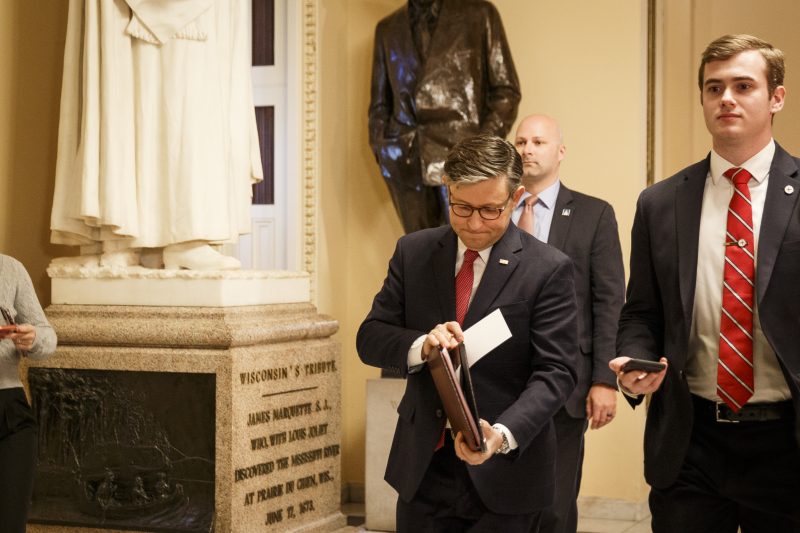Congress passed legislation Thursday to prevent a looming partial government shutdown, extending funding for federal agencies later into March — and teeing up another mad scramble over policy and spending negotiations with another shutdown deadline only about a week away.
The stopgap spending bill — known as a continuing resolution, or CR — cleared the Senate by a 77-13 vote Thursday evening after winning House approval by a 320-99 margin in the afternoon.
The legislation pushes the funding deadline to March 8 for several agencies, including the Departments of Veterans Affairs, Transportation, Energy, Agriculture, Interior, and Housing and Urban Development, as well as the Environmental Protection Agency. Financing for most of those agencies was set to expire Saturday just after midnight.
Funding for the rest of the federal government under the bill expires March 22, two weeks later than under current law. The measure now heads to President Biden’s desk for his signature.
“What we have done today has overcome the opposition of the MAGA hard right and gives us a formula for completing the appropriations process in a way that does not shut the government down and capitulate to extremists,” Senate Majority Leader Charles E. Schumer (D-N.Y.) said on the Senate floor just before the vote.
Even a partial shutdown would have sparked broad, cascading effects across the government and economy. Air traffic controllers would have gone unpaid, potentially contributing to travel delays. Food stamp programs could quickly have run low on funding. Housing assistance for millions of families could have fallen into jeopardy.
Lawmakers said Thursday’s bill was better than a shutdown but still just a small consolation. Congress was supposed to have several appropriations, or spending bills for the rest of the fiscal year, ready to pass by the end of the week. Instead, bickering over policy demands pushed the federal government to the brink of a shutdown again, necessitating another stopgap spending bill — the third since September — to buy more time.
“The appropriations process is ugly. Democracy is ugly,” House Speaker Mike Johnson (R-La.) said Thursday.
Democrats, fed up with House Republicans’ foot-dragging and temporary spending bills, agreed.
“If that’s what it takes to get this done, then let’s do it. But this ‘kicking the can down the road’ crap really does need to stop,” Sen. Jon Tester (Mont.), the top Democratic negotiator on the defense appropriations bill, said Wednesday.
“Let this be our last continuing resolution,” Rep. Rosa DeLauro (Conn.), the Democrats’ top House negotiator, said Thursday on the House floor.
This government funding process was supposed to be far less fraught. Biden and then-Speaker Kevin McCarthy (R-Calif.) last spring agreed to constrain federal spending for the 2024 fiscal year, which began Oct. 1 and ends Sept. 30, in exchange for suspending the debt limit.
But far-right lawmakers in the House grew furious with McCarthy for not extracting deeper spending cuts, and they ultimately ousted him from the speakership. Republicans elected Johnson as his replacement in late October, and the Louisianian has struggled to navigate spending debates ever since.
In November, he steered the House to pass a stopgap funding bill that staggered funding deadlines for the federal government over two dates, then pledged he would not consider another temporary spending law.
In January, he and Schumer agreed to a $1.7 trillion fiscal framework, adhering to the limits set by the debt ceiling agreement — then passed another short-term funding bill to allow appropriators sufficient time to negotiate individual line items.
But last week, the speaker told Republicans on a conference call that the spending bills he had worked out with Schumer had plenty of “singles and doubles” — conservative wins on spending and policy — but not “home runs or grand slams,” which many right-wing lawmakers had insisted on.
Those negotiations dragged on too long for Congress to have spending legislation completed before federal funding expires this weekend.
“We knew finding common ground would not be easy. But we’ve made progress and need a few more weeks to finish drafting the bills,” Rep. Kay Granger (R-Tex.), chairwoman of the House Appropriations Committee, said Thursday on the House floor.
Republicans griped that since Johnson’s call last week, the speaker has neither shared what any of the conservative wins might be nor divulged them during a Thursday morning meeting with his GOP conference. One lawmaker in attendance described that meeting as a “very rough” airing of grievances against the speaker’s handling of spending bills.
“People are gravely concerned that we’re not going to do anything on border,” the lawmaker said, speaking on the condition of anonymity to discuss the private meeting. “We keep saying we’re going to cut spending, but we haven’t.”
“I’d like to know the examples of the ‘doubles,’” Rep. Bob Good (R-Va.), chairman of the archconservative House Freedom Caucus, said after the meeting. “And I haven’t heard anything that we’re going to get policy-wise that I would consider ‘doubles.’”
Sen. Lindsey Graham (S.C.), the top Republican Senate negotiator on the State Department spending bill, said Thursday that he and other appropriations leaders have seen near-final copies of the larger full-year spending package, but he declined to share details of the policy provisions included in the legislation.
“When you’ve got a Democratic president, a Democratic Senate, there’s only so much you can do, but I think he’s done a really good job of hitting singles and doubles,” Graham told The Washington Post.
The only hang-up, he said, is whether the detailed funding deal that congressional leaders hope to release this weekend can hold up against opposition from far-right lawmakers in the House.
“I think there’s several things that, if it sticks, would be good policy changes, a good use of changing taxpayer dollars,” Graham said. “Time will tell.”
The Freedom Caucus and a growing chorus of other conservatives have pushed Johnson to buck the debt limit deal from last year and press for conservative policy provisions — on issues including restrictions on abortion access and LGBTQ rights as well as clawing back Biden’s climate agenda and immigration orders — as part of a funding agreement.
Short of those achievements, Johnson’s right flank has urged him to abandon passing appropriations bills altogether and extend funding on a temporary basis until October, which would trigger across-the-board spending cuts throughout the federal government as part of the deal that suspended the debt limit. Those cuts would even hit defense spending, long a sacred cow to Republicans.
“Here we are again, kicking the can down the road and for other purposes,” Rep. Chip Roy (R-Tex.), a leading Freedom Caucus budget hawk, said on the House floor Thursday, “to buy more time to spend more money we don’t have.”
But Johnson and his raucous House Republican Conference have very little leverage to exact those spending cuts or policy wins. The Freedom Caucus has routinely blocked procedural votes, stalling business on the House floor in protest of the speaker’s spending decisions.
Having only a tiny GOP majority, Johnson has been forced to court support from Democrats for nearly any legislation to clear the chamber.
“We need a larger majority,” said Rep. Thomas Massie (R-Ky.), the hard-right budget hawk who wrote the proposal for the government-wide spending cuts. “It’s almost impossible right now with a two-seat majority.”
Marianna Sotomayor contributed to this report.



























